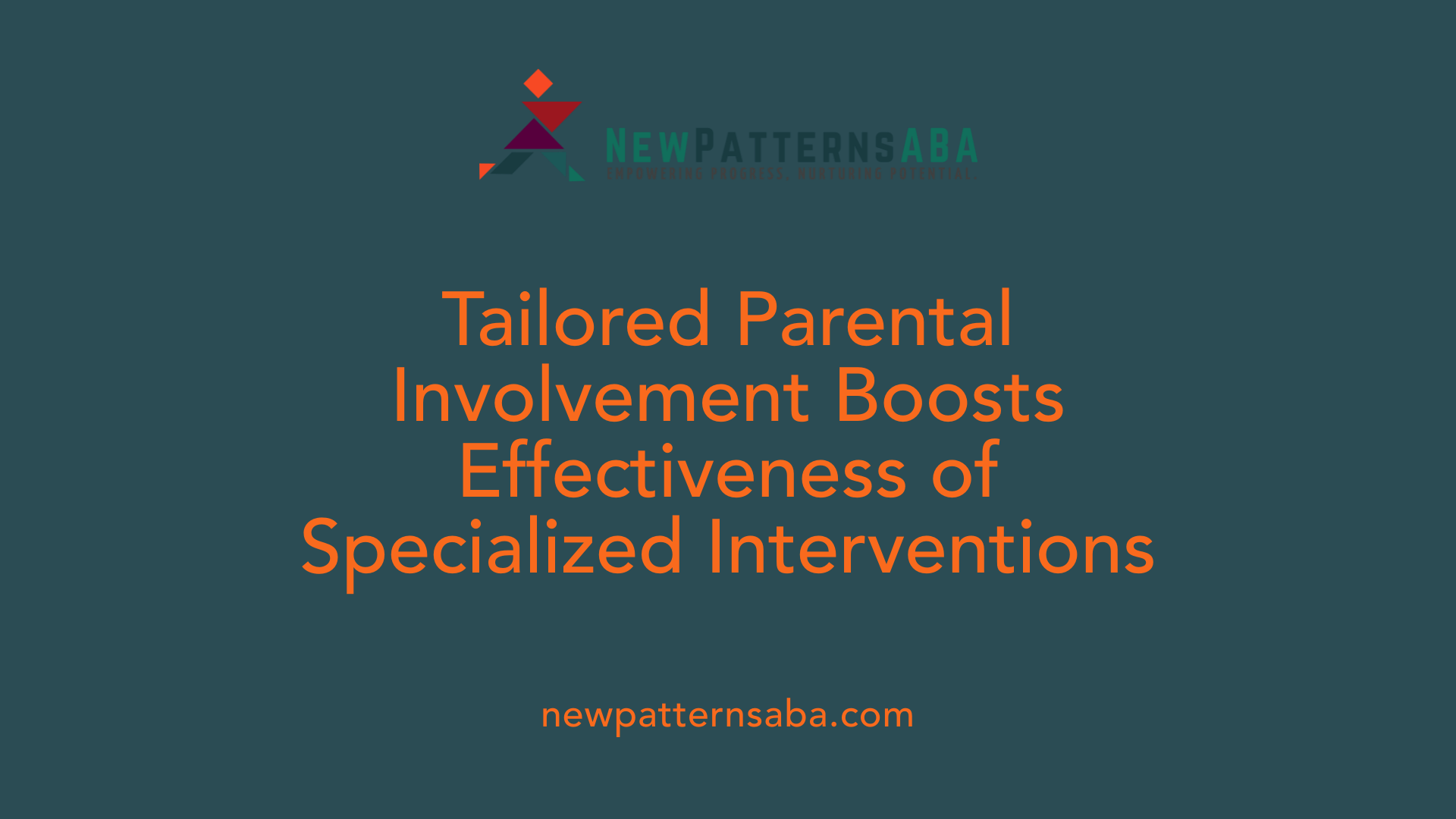Understanding the Crucial Impact of Parental Involvement
Parental involvement plays a pivotal role in the success of behavioral therapy for children and adolescents. From shaping positive behaviors to ensuring consistent application of therapeutic strategies, engaged parents serve as vital partners in the treatment process. This article explores the significance of parental participation, supported by research, practical strategies, and the influence across different therapy modalities.
The Significance of Parental Involvement in Child Behavioral Therapy

Why parental participation is crucial
Parental involvement is a vital component of effective behavioral therapy for children. Engaged parents contribute in numerous ways, including sharing their observations, participating in therapy sessions, completing homework, and supporting their child's learning at home. This active role helps reinforce skills learned during therapy and encourages consistent application across different environments.
Well-informed and supportive parents foster a sense of control and empowerment, which boosts both their confidence and their child's progress. When parents receive tailored information and build strong relationships with professionals, they are better equipped to meet their child's specific needs.
The influence of active engagement on therapy outcomes
Research indicates that active parental engagement leads to better treatment results. It accelerates progress, improves communication between families and clinicians, and enhances adherence to therapeutic strategies. For example, parent training programs improve behavioral skills, reduce stress, and increase satisfaction, all of which positively influence the child's development.
Moreover, parental involvement enables therapists to tailor interventions more precisely. When parents understand the treatment goals and strategies, they can effectively implement them at home, leading to more generalized and lasting behavior change.
Benefits of a collaborative parent-professional relationship
A strong partnership between parents and professionals, grounded in trust, transparency, and good communication, is associated with significant improvements in therapy outcomes. Parents value qualities such as honesty, kindness, and expertise, which foster a positive collaboration.
Effective partnerships also help overcome barriers such as poor communication or perceived lack of support. When professionals provide clear explanations of treatment plans and involve parents in decision-making, families feel more supported and committed.
In conclusion, fostering active parental participation and nurturing collaborative relationships are essential for successful behavioral interventions. These strategies not only empower families but also substantially enhance the effectiveness of therapy programs.
| Aspect | Impact | Additional Details |
|---|---|---|
| Parental participation | Accelerates progress, improves adherence | Engaged parents reinforce skills, support generalization |
| Clinician-parent relationship | Better therapy outcomes | Trust, honesty, good communication foster success |
| Parent training | Reduced stress, increased satisfaction | Teaches practical strategies, increases confidence |
| Tailored support | Meets child's specific needs | Based on child's diagnosis, age, behavior challenges |
Factors Shaping Effective Parent-Professional Partnerships
What evidence exists regarding parental contributions to behavioral therapy success?
Research consistently demonstrates that parents play a vital role in the success of behavioral therapy for children with behavioral challenges. Active involvement by parents—such as supporting learned strategies, maintaining consistent routines, and collaborating with professionals—leads to better treatment outcomes.
Studies highlighted in scholarly articles show that when parents are engaged throughout therapy, children tend to exhibit more significant behavioral improvements. For example, behavioral parent training (BPT) programs have been proven effective in managing conditions like ADHD, oppositional defiant disorder, and conduct disorder.
Parental support influences therapy success through several pathways:
- Reinforcing behavioral techniques at home
- Maintaining open and honest communication with clinicians
- Modeling positive behaviors for children
Access to extensive research indicates that the quality of the parent-professional partnership—especially levels of trust, communication, and perceived support—directly impacts therapeutic results. Moreover, parental involvement is more impactful when parents feel supported and are actively participating.
In summary, the active role parents take in treatment—supported by scientific evidence—substantially amplifies the effectiveness of behavioral intervention programs, making caregiver engagement essential for optimizing child outcomes.
Strategies for Parents to Facilitate and Sustain Therapy Gains
How can parents facilitate and support their child's behavioral therapy?
Parents play a vital role in the success of their child's behavioral therapy by actively engaging in the treatment process and applying learned strategies consistently across various settings. Participating in parent training programs equips them with practical skills to manage behaviors and reinforce positive change.
Consistent application of ABA (Applied Behavior Analysis) techniques at home and in the community ensures that children experience continuity, which encourages skill generalization. Maintaining open, honest communication with therapists is crucial; sharing observations, progress notes, and concerns helps tailor interventions effectively.
Practical tools such as data collection sheets, visual schedules, and reward systems support behavior management and reinforce learning. These tools help children understand expectations and recognize their progress.
Incorporating ABA methods into daily routines—like homework, chores, or social activities—turns learning into a natural part of life. Using technology, such as behavior tracking apps, further facilitates monitoring and adjusting strategies.
Parent involvement doesn't stop at just applying techniques. Attending parent training and support groups enhances understanding and confidence, enabling parents to advocate effectively for their child's ongoing needs. Their active participation has been shown to significantly improve behavioral outcomes and overall development.
Research underscores the importance of parental presence and consistency in behavioral interventions, particularly for disorders like ADHD and conduct problems. When parents are engaged and informed, they become essential partners in the journey toward improved behavior and functioning.
The Impact of Support and Training on Therapy Outcomes

What is the importance of parental support and training in therapy outcomes for children with conditions such as anxiety, ADHD, and behavioral issues?
Parental support and training play a vital role in improving therapy results for children facing various challenges like anxiety, ADHD, and behavioral problems. When parents are actively involved, they can reinforce the strategies and skills learned during therapy sessions, applying them consistently at home and in everyday situations. This continuity helps children develop better self-control, reduce disruptive behaviors, and manage anxiety more effectively.
Programs such as SPACE (Supportive Parenting for Anxious Childhood Emotions) exemplify how educating parents to modify accommodating behaviors can significantly decrease anxiety symptoms. By reducing family accommodation, parents help their children face anxieties directly, which leads to improved social functioning and reduced distress. Research indicates that parent-based interventions can be just as effective as traditional child therapies, emphasizing the importance of empowering parents.
Moreover, training programs improve parental confidence, enabling them to tolerate their child's distress while providing supportive responses. This resilience-building fosters a more secure environment for the child's emotional growth. When parents understand how to implement therapeutic techniques and maintain consistency outside of clinical settings, the overall treatment effectiveness increases.
Studies further support that parental involvement accelerates progress and sustains therapeutic gains over time. As parents become more adept at managing their child's needs, children often show improved self-esteem, better behavior, and stronger relationships. Consequently, training caregivers benefits not just the child's immediate well-being but also its long-term development.
Additional Insights
| Program | Focus | Outcomes | Supporting Research |
|---|---|---|---|
| SPACE | Reducing family accommodation in anxiety | Decreased child anxiety, lower parental stress | Helander et al., 2024 |
| Behavioral Parent Training | Managing ADHD symptoms | Improved behavior, parental well-being | Dekkers et al., 2022 |
| Parent Coaching | ABA and CBT support | Enhanced skill generalization, lower stress | Strive ABA Consultants |
Effective parental engagement and confidence further reinforce the child's progress, making family-centered therapy a cornerstone for successful treatment of childhood disorders.
The Vital Role of Parents in Behavioral Approaches like ABA and CBT

How does parental involvement impact specific therapeutic modalities such as ABA and CBT?
Parents play a crucial role in the success of behavioral therapies such as Applied Behavior Analysis (ABA) and Cognitive Behavioral Therapy (CBT). Their involvement often leads to better and faster outcomes. In ABA, parent participation helps children apply learned skills across different environments, such as home and school, fostering consistency. This active involvement speeds up progress and ensures that new behaviors are maintained.
In CBT, parents support the process by reinforcing strategies learned during therapy. They help children practice cognitive restructuring and emotional regulation outside of sessions. Supporting kids at home with praise, patience, and consistent routines magnifies therapy benefits.
Effective parent participation involves several key strategies:
- Attending training sessions to learn intervention techniques.
- Maintaining open, honest communication with therapists.
- Observing and understanding therapy sessions.
- Applying learned strategies regularly at home.
In essence, empowering parents with education and collaborative support creates a strong foundation for therapy. It helps children develop new skills, builds confidence, and encourages lasting behavioral change. The partnership between families and professionals is therefore pivotal for the long-term success of behavioral treatments.
Parental Engagement in Specially Tailored Interventions like SPACE and Trauma-Informed Care
 Parental involvement is fundamental to the effectiveness of targeted behavioral interventions such as Supportive Parenting for Anxious Childhood Emotions (SPACE) and trauma-informed approaches. These programs emphasize reducing family accommodation behaviors and addressing the specific needs of traumatized children.
Parental involvement is fundamental to the effectiveness of targeted behavioral interventions such as Supportive Parenting for Anxious Childhood Emotions (SPACE) and trauma-informed approaches. These programs emphasize reducing family accommodation behaviors and addressing the specific needs of traumatized children.
In anxiety management, family accommodation—parents’ attempts to help children avoid or lessen distress—can inadvertently maintain or worsen anxiety symptoms. SPACE directly targets these behaviors by teaching parents strategies to reduce accommodation, thereby fostering greater independence in children. Studies have shown that SPACE is as effective as traditional cognitive-behavioral therapy (CBT) for reducing child anxiety, with the added benefit of improving family dynamics and lowering parental stress.
When dealing with trauma, a trauma-sensitive approach tailors parental involvement to address the child's emotional safety and trust. Parents are guided to support their child's recovery through empathetic listening, consistent routines, and avoiding re-traumatization triggers. Special attention is given to addressing overdependence, which can impede the child's progress and resilience.
Effective strategies across these interventions include active parent training, collaborative goal-setting, and open communication. Such approaches empower parents to serve as active change agents, applying learned techniques consistently at home and in other settings. This engagement boosts the child's confidence, reduces reliance on external supports, and promotes healthier emotional development.
| Aspect | Focus | Outcome | Additional Notes |
|---|---|---|---|
| Reducing family accommodation | Teach parents to lessen behaviors that shield children from anxiety or trauma triggers | Decreases severity of symptoms and improves functioning | Critical in treating childhood anxiety and trauma |
| Parent training in trauma-sensitive care | Educate about creating safe, trusting environments | Supports emotional resilience and recovery | Includes routines, empathetic responses, and avoiding re-traumatization |
| Addressing overdependence | Balance support with promoting independence | Enhances coping skills and resilience | Particularly important in traumatized children |
| General strategies | Open communication, collaborative planning, structured activities | Fosters trust, confidence, and adherence to intervention | Improves overall therapy effectiveness |
Research supports that a trauma-sensitive and family-centered approach not only addresses the child's specific needs but also strengthens the parent-child relationship. Tailored interventions promote healing, reduce anxiety and trauma symptoms, and help children develop healthy coping mechanisms, ultimately ensuring more positive outcomes.
Building a Foundation of Trust, Honesty, and Knowledge for Successful Therapy Partnerships

What qualities anchored in the professional’s approach foster successful parent-professional partnerships?
Parents highly value certain qualities in professionals that contribute to strong, effective treatment collaborations. Essential attributes include trust, honesty, good communication, kindness, and a deep knowledge of behavioral methods and the child’s specific disability. When therapists exhibit these traits, they create a supportive environment where parents feel respected and understood.
A parent’s confidence in a professional’s expertise and integrity encourages open sharing of concerns and insights. This openness is vital for tailoring interventions that truly meet the child's needs. Additionally, showing kindness and compassion helps build emotional safety, making parents more willing to engage actively in the treatment process.
Overcoming barriers such as perceived inexperience, poor communication, and lack of reciprocal support is crucial for success. When professionals demonstrate empathy, competence, and transparency, it fosters trust and reassures parents that their child is receiving qualified care.
Building this collaborative relationship not only improves parent engagement but also enhances treatment outcomes for children. A positive partnership enables better coordination, increased adherence to strategies, and ultimately leads to more effective behavioral interventions.
Fostering Parental Engagement for Long-Term Success
Parental involvement fundamentally influences the efficacy of behavioral therapy for children and adolescents. Through active participation, effective communication, and tailored support, parents serve as vital contributors to positive change. Training programs, ongoing support, and fostering strong parent-professional partnerships create an environment conducive to sustained progress. Recognizing the importance of parental influence, clinicians and caregivers alike can work collaboratively to empower children, improve outcomes, and build resilient families equipped to face behavioral challenges. Ultimately, empowering parents transforms therapy from a structured intervention into a holistic, family-centered journey toward lasting improvement.
References
- Parental perspectives on successful parent education and ...
- Involving Parents in Child Mental Health Treatments: Survey of ...
- The Research Behind Parent-Based Interventions
- The parents' role in their child's therapy - Mayo Clinic Press
- Parent-Based Treatment as Efficacious as Cognitive Behavioral ...
- Impact of ABA Therapy: The Key Role of Parental Involvement
- Engaging Parents in Their Child's Cognitive Behavioral Therapy





